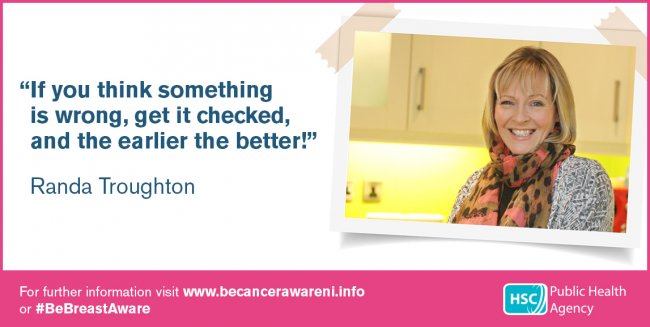Health Matters Issue 2
 PHA says be breast aware
PHA says be breast aware
The Public Health Agency’s (PHA) new campaign highlights the signs and symptoms of breast cancer, many of which may not be widely known, and encourages women who find any of them to contact their GP without delay.
One County Down woman has spoken about her experience of the condition and urged others to be breast aware.
Randa Troughton, mid 40’s, a nurse from Hillsborough, was diagnosed with breast cancer in late 2004, just months after she got married.
Randa said: “I considered myself to be very active, enjoying running and going to the gym, and felt that my general health was very good.
“In the autumn of 2004 I noticed a lump and had some localised breast pain. I felt something wasn’t quite right and although at times the lump was very difficult to feel, I knew it was there.” Concerned about what this could mean, Randa sought the advice of medical professionals.
“I remember being very worried when I first noticed the lump, and to be honest I was in a bit of denial, hoping it would go away. I thought I was too young for it to be anything sinister, but knew I had to do something about it. I went to see my GP and from there I was referred to the Belfast City Hospital breast clinic. I had an examination, a scan and a biopsy, which unfortunately showed cancerous cells. Further scans showed pre-cancerous cells throughout my breast, and post-surgery investigations revealed that it had spread to one of my lymph nodes.
“The news of the diagnosis, and then hearing that the cancer had spread, was shocking – I was told that everything would have to be removed. In November 2004 I had a mastectomy, my lymph nodes were removed and I underwent the reconstruction using my stomach fat, muscle and skin. This was followed by chemotherapy and radiotherapy. I was then prescribed medication for five years to reduce the risk of breast cancer coming back."
Eleven years on, Randa is sharing her story to showcase the importance of being breast aware and of early diagnosis. “Being breast aware means knowing your own breasts and being aware of what changes to look out for.
“I still work as a nurse for the Belfast Trust, which I really enjoy and I get to help others. I can still do what I want to do and I am enjoying the new challenge of paddling with the Lagan Dragons. My advice to other women would be: whatever the symptom, you know your own body – if you think something is wrong, although it could be nothing, get it checked, and the earlier the better!”
For further information on breast cancer and other types of cancer, check out the Public Health Agency’s Be Cancer Aware website at www.becancerawareni.info #bebreastaware
How a quick, free scan can save lives
 The Public Health Agency’s Northern Ireland Abdominal Aortic Aneurysm (AAA) Screening Programme was introduced in June 2012. Its aim is to reduce deaths from an AAA by 50%.
The Public Health Agency’s Northern Ireland Abdominal Aortic Aneurysm (AAA) Screening Programme was introduced in June 2012. Its aim is to reduce deaths from an AAA by 50%.
All men in their 65th year are automatically invited by the programme. Men over the age of 65, who have never attended for AAA screening, can ask to be screened by contacting the Screening Programme Office on Tel: 028 9063 1828.
Men are offered a quick, simple ultrasound scan of their abdomen and are given their results at the appointment. Not every AAA will rupture; however, if it does, the chances of getting to hospital and surviving emergency surgery are poor.
If men are screened and found to have a small or medium-sized AAA they will be kept under surveillance and scanned, respectively, every year or every three months. Men found to have a large AAA are referred to the vascular team in the Belfast Trust for further investigations and to discuss treatment options.
Men are six times more likely than women to have an AAA, which is why the programme is aimed at them. To date the programme has scanned over 30,000 men. It has detected 486 AAAs, of which 62 men have been referred on to the Vascular Service for surgery.
For more information about this vital health check – a simple procedure which could be life-saving – please contact the Programme Office on 028 9063 1828.
Alternatively, please visit the Programme website at www.aaascreening.info
